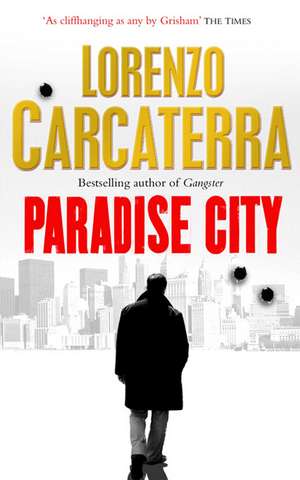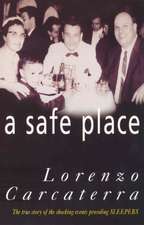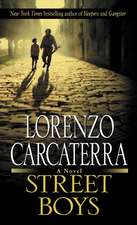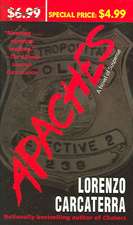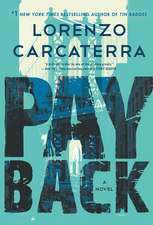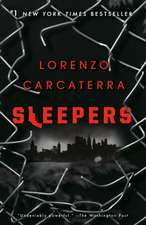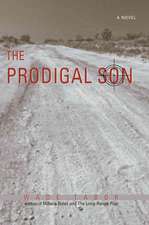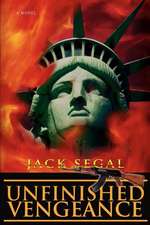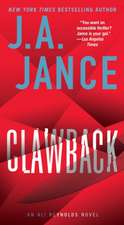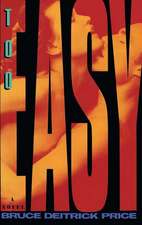Paradise City
Autor Lorenzo Carcaterraen Limba Engleză Paperback – 3 apr 2005
| Toate formatele și edițiile | Preț | Express |
|---|---|---|
| Paperback (2) | 55.18 lei 3-5 săpt. | |
| Fawcett Books – 31 iul 2005 | 55.18 lei 3-5 săpt. | |
| Simon&Schuster – 3 apr 2005 | 123.00 lei 6-8 săpt. |
Preț: 123.00 lei
Nou
Puncte Express: 185
Preț estimativ în valută:
23.54€ • 24.57$ • 19.48£
23.54€ • 24.57$ • 19.48£
Carte tipărită la comandă
Livrare economică 05-19 aprilie
Preluare comenzi: 021 569.72.76
Specificații
ISBN-13: 9780743495745
ISBN-10: 0743495748
Pagini: 496
Ilustrații: None
Dimensiuni: 111 x 178 x 33 mm
Greutate: 0.26 kg
Ediția:New ed.
Editura: Simon&Schuster
Colecția Simon & Schuster UK
Locul publicării:United States
ISBN-10: 0743495748
Pagini: 496
Ilustrații: None
Dimensiuni: 111 x 178 x 33 mm
Greutate: 0.26 kg
Ediția:New ed.
Editura: Simon&Schuster
Colecția Simon & Schuster UK
Locul publicării:United States
Descriere
A sensational return to the underworld of GANGSTERS and SLEEPERS by the bestselling author Lorenzo Carcaterra.
Notă biografică
LORENZO CARCATERRA is the author of Street Boys, Gangster, A Safe Place, and the New York Times bestsellers Sleepers and Apaches. He has written scripts for movies and television, and he has worked as a writer and producer for Law & Order. Learn more about his work at www.LorenzoCarcaterra.com.
From the Hardcover edition.
From the Hardcover edition.
Extras
1
Naples, Italy Summer 2003
Giancarlo Lo Manto had his back against a ragged stone wall, a nine-millimeter gun in his hands, one bullet slipped into the chamber. He lowered his head and closed his eyes, alert to any sounds in the vestibule closest to apartment 3E. He could smell burnt meat sizzling in oil and he heard Eros Ramazzotti singing “Dammi la Luna” on a dusty CD. He knew most of the other apartments were empty at this hour on a Sunday morning—husbands, wives, and children off to morning mass and a casual outdoor breakfast before spending the rest of the day with relatives. He also knew the four men who lived in the small apartment in the middle of the hallway on the third floor had no plans for their day other than to lay low and wait for the sun to set.
Lo Manto opened his eyes and looked at the two men standing across the hall. They were each about a decade younger than he, dressed in civilian clothes but with Kevlar vests strapped over their shirts, guns in their hands and police IDs pinned to their jackets. They were nervous, their faces coated with thin lines of sweat, their eyes fixed on the dead-bolted door in front of them. Lo Manto glanced at his watch, then looked back up at the two officers and nodded. They moved to either side of the door and waited, hands wrapped around their weapons, eyes on Lo Manto, backs jammed hard against the wall. Lo Manto leaned his body into the apartment door and banged on it three times with the butt end of his gun. He waited through several seconds of silence, then repeated the knocks. He moved his shoulders off the door as soon as he heard the dead bolt snap free. He could feel the door give against the weight from the other side. He looked down and saw the doorknob turn slowly and then stop. Lo Manto took three steps back, stretched out his arms, and pointed his gun at the middle of the door.
Then they all waited for the first move.
Lo Manto had experienced a lifetime of these situations during his seventeen years on the Naples police force, the last eight working perhaps the most dangerous beat in all of Europe, the homicide division. He had enough scars on his body and enough long stays in hospital wards to know that what would soon happen would be decided within the snap of a second—and that luck as much as skill determined who died and who walked. He glanced at the two young officers assigned as his backup, both woefully inexperienced for a one-man street takedown, let alone a break-in bust of four Camorra shooters. He could see their fear. They prayed to avoid moments such as those that were about to happen. Lo Manto’s prayers, however, pointed in a different direction. His life was designed around pursuits, shoot-outs, and captures. He loved every second of being a street cop. He relished the piecing together of clues and working the streets to gather information he needed to build a case. He would circle his prey and then, once a criminal’s mistake was made or an informant’s tip proved accurate, make the move that would lead to either cuffs slapped on a pair of unwilling wrists or a body bag zippered over a hard-eyed face. It was during those moments of high tension, with lives on the line and where any one decision could prove fatal, that Lo Manto was most in control and in command.
It was a place where he truly belonged.
Lo Manto saw the door open a crack and made his move. He lowered his shoulder and rushed the door, sending the man behind it reeling, knocking over a chair and a flowerpot as he fell. Lo Manto rolled onto his knees and came up staring at four men, one on the floor and three spread across a tiny dining area, each with a gun in hand, cocked and pointed down at him. The two officers outside the apartment held their position as he had previously instructed them to do. “Who do I talk to?” Lo Manto asked, speaking in a full, rich Neapolitan dialect, his eyes moving slowly from one face to the next.
The skinny man in the center of the room nodded and lowered his gun. “Me,” he said. “I’m in charge.”
“Okay if I stand?” Lo Manto asked, easing one leg off the floor. “Makes it easier to talk.”
“Leave the gun on the floor,” the skinny man said. “And your hands at your side.”
Lo Manto put his gun on the hardwood surface and stood. He straightened the collar of his thin black leather jacket and walked toward the table in the center of the room. He looked into the kitchen and saw a large pot of coffee resting on the front burner of the stove. “Why don’t you pour me a cup,” he said to the skinny man, “and I’ll tell you why I’m here. Three sugars, but only if you make it strong.”
Lo Manto pulled a wooden chair away from the Formica table and sat down, his eyes on the skinny man, his back to the three others. The skinny man jammed his gun into his waistband and stepped into the kitchen, reaching out his left hand for an empty cup. With his right, he lifted the pot from the stove to pour out a thin line of coffee. He put the pot back, walked to the table, and slid the cup toward Lo Manto. “We’re out of sugar,” the skinny man said. “You have to drink it the way I made it.”
Lo Manto lifted the cup to his lips and swallowed two quick gulps. “It’s a good cup of coffee, but not great,” he said. “Has that harsh prison taste to it. You let it cook too long. You’re not used to working with a stove after all those years brewing coffee by candle flame.”
The skinny man reached for his gun, raised it, and pointed it at Lo Manto’s chest. “You know how much I can make for shooting you dead?” he asked. “You have any idea what the Rossis would pay to see your funeral?”
Lo Manto casually finished the coffee and rested the cup on the edge of the table. “Two hundred and fifty thousand euros, last I heard,” he said. “But they don’t plan on paying it. That’s why it’s so high. So, if you kill me, they would then simply kill you. Which now brings me to the reason I’m here.”
“I’m listening,” the skinny man said, nodding at the three men behind Lo Manto. “We’re all listening.”
“I have a warrant in my jacket pocket to arrest the four of you,” Lo Manto said. “That explains the business with the door and the reason for such an early visit.”
“What’s the charge?” the skinny man asked.
“I didn’t read it all the way through,” Lo Manto said. “But from what I did see, it fits your usual pattern. Attempted murder, drug possession, conspiracy and—I’d have to look again to make sure—kidnapping. With your records, a conviction on any one of those charges would have you making coffee by candlelight the rest of your lives.”
“You’re not arresting anybody,” the skinny man said with a crooked smile that showed off a row of darkened lower teeth. “Not today and not with four guns pointed at you.”
“I don’t want to arrest you,” Lo Manto said. “And with your help and a little bit of luck, I won’t have to.”
“What do you want?”
“A name,” Lo Manto said bluntly. “And a place where I can find that name.”
“Whose?”
“The man who killed Peppino Alvatar,” Lo Manto said. “I want him and you know who he is and where he is.”
The skinny man shook his head, the smile fading from his face. “I let you arrest me, all I get is a prison sentence. I give you that information, I get a death sentence. And I’m not looking to die.”
“Take a minute and try to think smart,” Lo Manto said. “Sooner or later, the Rossis are going to look to lose baggage like you. For all the good you do, you also cause a lot of grief. With each arrest, that’s only going to get worse. They know your kind breaks and talks and they won’t ever let that happen. Before that day comes, I can have your sentence for these fresh charges kept to a minimum. But I need a name and a place.”
The skinny man held Lo Manto’s look for several seconds, his breathing coming heavier, fingers stroking the sides of his handgun. “Maybe that’s all true,” he said. “But maybe all that goes away if I bring the Rossis something they’ve always wanted.”
Lo Manto smiled and sat back in his chair. “Me?” he asked.
“You,” the skinny man said. “Dead on their doorway. After all I heard this morning, that sounds like the best deal of all.”
“Some deals are tougher than others to close,” Lo Manto said.
“Not this one,” the skinny man said, raising his gun and cocking the trigger. Behind him, Lo Manto could hear the other three men step in closer.
Lo Manto kept his eyes on the skinny man and then slid off his chair and lifted the Formica table by the two front legs and swung it around the room, using it as a shield. From outside the apartment, the two officers tossed in three hissing smoke grenades and followed them into the tight quarters, guns drawn and aimed at the three men firing at the table. Lo Manto grabbed his nine-millimeter and fired off three quick rounds in the direction of the shooters, the apartment now completely engulfed in smoke. He heard two drop and left the third man to the officers who would be positioned against the walls closest to the foyer closets, giving them both leverage on the shooter and protection from any wayward shots. That left only the skinny man. He had run through the kitchen and was climbing over the terrace railing, his hands gripping the black iron bars of the railing. Lo Manto kicked aside the table and walked into the kitchen. He stopped at the base of the terrace and saw the skinny man hanging on the edges of the curled bars with two hands, gun buried inside his waistband.
“We got two down and one in cuffs, Inspector,” the youngest of the two officers shouted out to Lo Manto.
“Wounded or dead?” Lo Manto asked without turning his head, eyes on the skinny man.
“One’s alive,” the officer said. “At least for the moment.”
“Call for an ambulance and the morgue truck,” Lo Manto said. “Then take your prisoner in to be booked. I’m going to spend a few more minutes with my friend.”
Lo Manto looked past the skinny man and down into the tight backyard three floors down. “It’s a broken leg at the very least,” he said. “But that’s if you fall right. You get yourself hung up on one of those lines or brush against those trees, who knows what can happen?”
The skinny man turned to look down and then back at Lo Manto. “Help me up,” he said.
Lo Manto put his gun back against his spine and rested his arms on top of the iron railing. “I was only kidding before,” he said to the skinny man. “I really did like that coffee you made. I’m going to get myself a second cup. While I’m gone, try to remember that name and place I was asking about.”
“Help me up first,” the skinny man said, his fingers starting to tremble from the grip he held on the curved bars.
In the kitchen, Lo Manto found a clean cup and poured himself some coffee, the smoke from the grenades washing past him like clouds. He looked toward the skinny man and smiled. “Are you sure you don’t have any sugar?” he asked.
From the Hardcover edition.
Naples, Italy Summer 2003
Giancarlo Lo Manto had his back against a ragged stone wall, a nine-millimeter gun in his hands, one bullet slipped into the chamber. He lowered his head and closed his eyes, alert to any sounds in the vestibule closest to apartment 3E. He could smell burnt meat sizzling in oil and he heard Eros Ramazzotti singing “Dammi la Luna” on a dusty CD. He knew most of the other apartments were empty at this hour on a Sunday morning—husbands, wives, and children off to morning mass and a casual outdoor breakfast before spending the rest of the day with relatives. He also knew the four men who lived in the small apartment in the middle of the hallway on the third floor had no plans for their day other than to lay low and wait for the sun to set.
Lo Manto opened his eyes and looked at the two men standing across the hall. They were each about a decade younger than he, dressed in civilian clothes but with Kevlar vests strapped over their shirts, guns in their hands and police IDs pinned to their jackets. They were nervous, their faces coated with thin lines of sweat, their eyes fixed on the dead-bolted door in front of them. Lo Manto glanced at his watch, then looked back up at the two officers and nodded. They moved to either side of the door and waited, hands wrapped around their weapons, eyes on Lo Manto, backs jammed hard against the wall. Lo Manto leaned his body into the apartment door and banged on it three times with the butt end of his gun. He waited through several seconds of silence, then repeated the knocks. He moved his shoulders off the door as soon as he heard the dead bolt snap free. He could feel the door give against the weight from the other side. He looked down and saw the doorknob turn slowly and then stop. Lo Manto took three steps back, stretched out his arms, and pointed his gun at the middle of the door.
Then they all waited for the first move.
Lo Manto had experienced a lifetime of these situations during his seventeen years on the Naples police force, the last eight working perhaps the most dangerous beat in all of Europe, the homicide division. He had enough scars on his body and enough long stays in hospital wards to know that what would soon happen would be decided within the snap of a second—and that luck as much as skill determined who died and who walked. He glanced at the two young officers assigned as his backup, both woefully inexperienced for a one-man street takedown, let alone a break-in bust of four Camorra shooters. He could see their fear. They prayed to avoid moments such as those that were about to happen. Lo Manto’s prayers, however, pointed in a different direction. His life was designed around pursuits, shoot-outs, and captures. He loved every second of being a street cop. He relished the piecing together of clues and working the streets to gather information he needed to build a case. He would circle his prey and then, once a criminal’s mistake was made or an informant’s tip proved accurate, make the move that would lead to either cuffs slapped on a pair of unwilling wrists or a body bag zippered over a hard-eyed face. It was during those moments of high tension, with lives on the line and where any one decision could prove fatal, that Lo Manto was most in control and in command.
It was a place where he truly belonged.
Lo Manto saw the door open a crack and made his move. He lowered his shoulder and rushed the door, sending the man behind it reeling, knocking over a chair and a flowerpot as he fell. Lo Manto rolled onto his knees and came up staring at four men, one on the floor and three spread across a tiny dining area, each with a gun in hand, cocked and pointed down at him. The two officers outside the apartment held their position as he had previously instructed them to do. “Who do I talk to?” Lo Manto asked, speaking in a full, rich Neapolitan dialect, his eyes moving slowly from one face to the next.
The skinny man in the center of the room nodded and lowered his gun. “Me,” he said. “I’m in charge.”
“Okay if I stand?” Lo Manto asked, easing one leg off the floor. “Makes it easier to talk.”
“Leave the gun on the floor,” the skinny man said. “And your hands at your side.”
Lo Manto put his gun on the hardwood surface and stood. He straightened the collar of his thin black leather jacket and walked toward the table in the center of the room. He looked into the kitchen and saw a large pot of coffee resting on the front burner of the stove. “Why don’t you pour me a cup,” he said to the skinny man, “and I’ll tell you why I’m here. Three sugars, but only if you make it strong.”
Lo Manto pulled a wooden chair away from the Formica table and sat down, his eyes on the skinny man, his back to the three others. The skinny man jammed his gun into his waistband and stepped into the kitchen, reaching out his left hand for an empty cup. With his right, he lifted the pot from the stove to pour out a thin line of coffee. He put the pot back, walked to the table, and slid the cup toward Lo Manto. “We’re out of sugar,” the skinny man said. “You have to drink it the way I made it.”
Lo Manto lifted the cup to his lips and swallowed two quick gulps. “It’s a good cup of coffee, but not great,” he said. “Has that harsh prison taste to it. You let it cook too long. You’re not used to working with a stove after all those years brewing coffee by candle flame.”
The skinny man reached for his gun, raised it, and pointed it at Lo Manto’s chest. “You know how much I can make for shooting you dead?” he asked. “You have any idea what the Rossis would pay to see your funeral?”
Lo Manto casually finished the coffee and rested the cup on the edge of the table. “Two hundred and fifty thousand euros, last I heard,” he said. “But they don’t plan on paying it. That’s why it’s so high. So, if you kill me, they would then simply kill you. Which now brings me to the reason I’m here.”
“I’m listening,” the skinny man said, nodding at the three men behind Lo Manto. “We’re all listening.”
“I have a warrant in my jacket pocket to arrest the four of you,” Lo Manto said. “That explains the business with the door and the reason for such an early visit.”
“What’s the charge?” the skinny man asked.
“I didn’t read it all the way through,” Lo Manto said. “But from what I did see, it fits your usual pattern. Attempted murder, drug possession, conspiracy and—I’d have to look again to make sure—kidnapping. With your records, a conviction on any one of those charges would have you making coffee by candlelight the rest of your lives.”
“You’re not arresting anybody,” the skinny man said with a crooked smile that showed off a row of darkened lower teeth. “Not today and not with four guns pointed at you.”
“I don’t want to arrest you,” Lo Manto said. “And with your help and a little bit of luck, I won’t have to.”
“What do you want?”
“A name,” Lo Manto said bluntly. “And a place where I can find that name.”
“Whose?”
“The man who killed Peppino Alvatar,” Lo Manto said. “I want him and you know who he is and where he is.”
The skinny man shook his head, the smile fading from his face. “I let you arrest me, all I get is a prison sentence. I give you that information, I get a death sentence. And I’m not looking to die.”
“Take a minute and try to think smart,” Lo Manto said. “Sooner or later, the Rossis are going to look to lose baggage like you. For all the good you do, you also cause a lot of grief. With each arrest, that’s only going to get worse. They know your kind breaks and talks and they won’t ever let that happen. Before that day comes, I can have your sentence for these fresh charges kept to a minimum. But I need a name and a place.”
The skinny man held Lo Manto’s look for several seconds, his breathing coming heavier, fingers stroking the sides of his handgun. “Maybe that’s all true,” he said. “But maybe all that goes away if I bring the Rossis something they’ve always wanted.”
Lo Manto smiled and sat back in his chair. “Me?” he asked.
“You,” the skinny man said. “Dead on their doorway. After all I heard this morning, that sounds like the best deal of all.”
“Some deals are tougher than others to close,” Lo Manto said.
“Not this one,” the skinny man said, raising his gun and cocking the trigger. Behind him, Lo Manto could hear the other three men step in closer.
Lo Manto kept his eyes on the skinny man and then slid off his chair and lifted the Formica table by the two front legs and swung it around the room, using it as a shield. From outside the apartment, the two officers tossed in three hissing smoke grenades and followed them into the tight quarters, guns drawn and aimed at the three men firing at the table. Lo Manto grabbed his nine-millimeter and fired off three quick rounds in the direction of the shooters, the apartment now completely engulfed in smoke. He heard two drop and left the third man to the officers who would be positioned against the walls closest to the foyer closets, giving them both leverage on the shooter and protection from any wayward shots. That left only the skinny man. He had run through the kitchen and was climbing over the terrace railing, his hands gripping the black iron bars of the railing. Lo Manto kicked aside the table and walked into the kitchen. He stopped at the base of the terrace and saw the skinny man hanging on the edges of the curled bars with two hands, gun buried inside his waistband.
“We got two down and one in cuffs, Inspector,” the youngest of the two officers shouted out to Lo Manto.
“Wounded or dead?” Lo Manto asked without turning his head, eyes on the skinny man.
“One’s alive,” the officer said. “At least for the moment.”
“Call for an ambulance and the morgue truck,” Lo Manto said. “Then take your prisoner in to be booked. I’m going to spend a few more minutes with my friend.”
Lo Manto looked past the skinny man and down into the tight backyard three floors down. “It’s a broken leg at the very least,” he said. “But that’s if you fall right. You get yourself hung up on one of those lines or brush against those trees, who knows what can happen?”
The skinny man turned to look down and then back at Lo Manto. “Help me up,” he said.
Lo Manto put his gun back against his spine and rested his arms on top of the iron railing. “I was only kidding before,” he said to the skinny man. “I really did like that coffee you made. I’m going to get myself a second cup. While I’m gone, try to remember that name and place I was asking about.”
“Help me up first,” the skinny man said, his fingers starting to tremble from the grip he held on the curved bars.
In the kitchen, Lo Manto found a clean cup and poured himself some coffee, the smoke from the grenades washing past him like clouds. He looked toward the skinny man and smiled. “Are you sure you don’t have any sugar?” he asked.
From the Hardcover edition.
Recenzii
“No one captures the sound and sense of the streets of New York City like Lorenzo Carcaterra. More than any other New York—based crime writer, he gets the city. His characters sound like the real thing, whether cops or criminals. Paradise City is Carcaterra at his best: an action-packed page-turner with a real hero at its center.”
–GARY FIDEL, executive assistant district attorney, Queens County District Attorney’s Office; technical adviser, Law & Order
“Few writers on the scene today weave a yarn with such relentless fervor as Lorenzo Carcaterra. His characters emerge from the page and enter the room with you, compassionate and honest, whispering in your ear, their dialogue as hard as a diamond cutter, their stories as compelling as a killer’s confession. That’s because Carcaterra has walked the walk, talked the talk, and lived the stories whereof he writes. So take a deep breath, hang on for dear life, and go for the ride wherever he may take you.”
–WILLIAM DIEHL
From the Hardcover edition.
–GARY FIDEL, executive assistant district attorney, Queens County District Attorney’s Office; technical adviser, Law & Order
“Few writers on the scene today weave a yarn with such relentless fervor as Lorenzo Carcaterra. His characters emerge from the page and enter the room with you, compassionate and honest, whispering in your ear, their dialogue as hard as a diamond cutter, their stories as compelling as a killer’s confession. That’s because Carcaterra has walked the walk, talked the talk, and lived the stories whereof he writes. So take a deep breath, hang on for dear life, and go for the ride wherever he may take you.”
–WILLIAM DIEHL
From the Hardcover edition.
